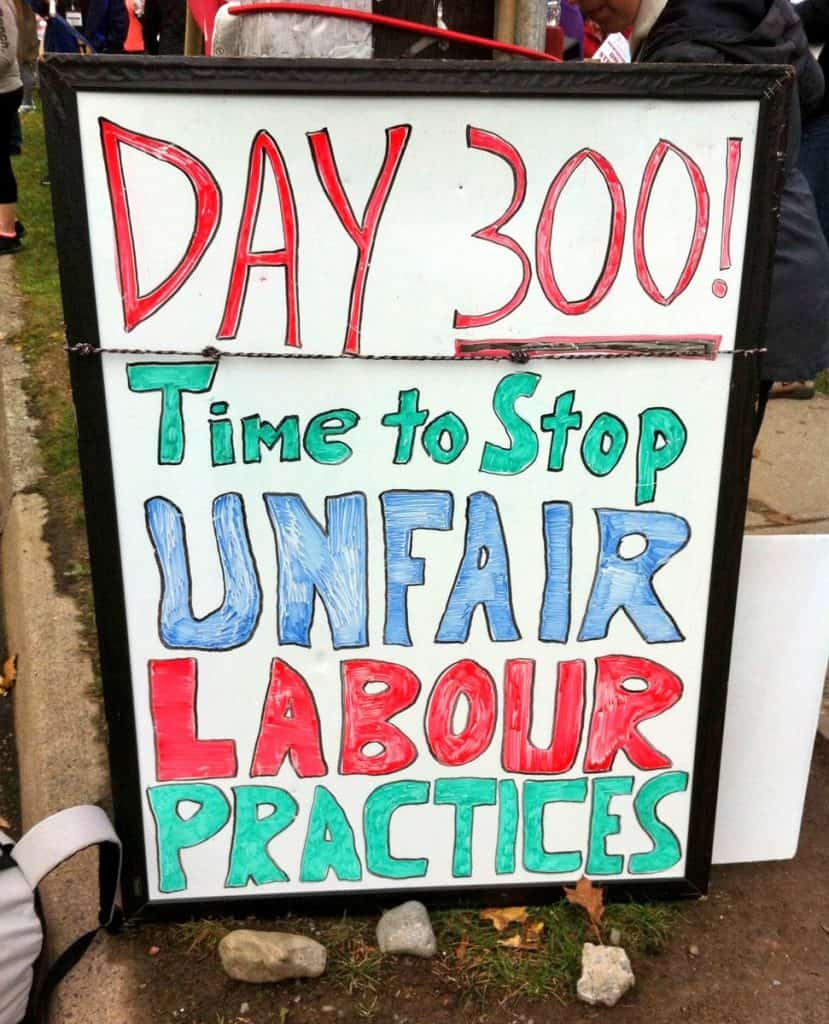
From Twitter
When the Halifax Chronicle Herald’s reporters and editors went on strike last January, I, like many readers, cancelled my subscription as a least-we-could-do gesture to support those journalists who produce the news that made the Herald an actual newspaper, and not just another advertising flyer.
Although I’d grown up with and subscribed for more than 45 years to Nova Scotia’s “newspaper of record,” I’ve done my best since the strike began to avoid reading it — except on those rare occasions when I’ve accidentally followed a Facebook or Twitter link to an interesting but unidentified Herald story, or on those less rare occasions when the newspaper did something so egregiously awful it was impossible not to pay attention in a yes-Martha-that-really-is-a-train-wreck sort of way.
But since I’m currently researching a magazine feature about what’s been going on at the Chronicle Herald, I did need to know what Mark Lever, the newspaper’s president and CEO, has been writing in his anti-union, “Dear Readers” screeds.
So I went to the Herald website and searched on the words: Mark Lever.
The Herald’s search engine helpfully replied: “Did you mean mark never?”
Could any two words better sum up what’s happening at the Chronicle Herald these days?
The company’s purpose has been clear from even before the beginning: destroy its journalists’ union, no matter the cost to its credibility or even, seemingly, its long-term survival.

Grant Machum
Let’s wind back to October 2015 when the paper’s chief negotiator — Halifax management lawyer Grant “Successfully-Advising-Employers-on-Operating-Union-Free-for-Over-20-Years” Machum — began talks on a new contract. First, he taunted union representatives that the Herald’s late publisher, Graham Dennis, “isn’t around to save you anymore,” then warned the union’s lead negotiator, Dave Wilson, that when all the pro forma bargaining back and forth had been backed and forthed, Herald journalists would be “in the snowbanks by January.”
For the record, Machum denies making those remarks, but the larger record is clear.
The workers did end up on the picket line in January. They were forced to strike after their employer announced plans to unilaterally impose its original, un-agreed-to contract proposal on them, including provisions that would have effectively gutted their union’s future bargaining power and resulted in the layoff of nearly one-third of their members.
During the course of bargaining, the union has agreed to some startling concessions:
- an across-the-board five per cent wage cut,
- an across-the-board increase in working hours,
- establishment of a new starting wage rate that is 25 per cent below current levels, and
- elimination of the company’s defined benefit pension plan.
By no-we-don’t-care-what-you-offer contrast, the Herald has actually added new demands to last fall’s original take-it-or-leave it offer:
- exclude four more positions from the bargaining unit, including one occupied by the union’s vice president,
- reduce sick leave pay after 30 days,
- reduce wages by a further four per cent, and
- lay off eight more employees (That’s in addition to the 18 previously circled for elimination. If you’re counting, that’s 26 layoffs plus four union members removed from the bargaining unit, meaning 30 of the 61 union members at the beginning of the strike would be gone.)
There’s no question legacy newspapers like the Herald are in deep financial trouble for all sorts of reasons — many beyond their control — but it’s also clear the Herald’s real goal in this dispute has been to destroy its unionized work force.
Let’s look at the Herald’s actual financial picture? According to the union, the company’s audited financial statements — which it has seen — “showed the Chronicle Herald to be profitable with a potential reduction in its profitability,” largely because the company is choosing to write down the capital costs of a $26-million printing press it acquired in 2003 more quickly than normal.
Is Herald management union busting?
While the union has been locked in its death struggle with the Herald, it has also been signing contracts with other newspapers across the country — without a strike or a harsh word. Some deals have even included modest salary increases. Dave Wilson, the union staff rep, recently negotiated contracts with all three New Brunswick dailies. In Saint John, he says, “we reached a deal in one hour and 24 minutes. And this is the Irvings!”
Two weeks ago, he spent a Thursday afternoon in Cape Breton negotiating a contract for workers at the Post, then flew to Halifax for what turned out to be yet another slammed-door round of non-talks with the Herald.
Incredibly, during that last abortive non-attempt to make a deal, the Herald upped the ante yet again, demanding the union not only close LocalXpress — its strike paper — but also turn over the url and all content created during the strike to the Herald! All union members, including those who will lose their jobs as a result of any contract would have to agree to sign a “non-disparagement” agreement to make nice with those who’d fired them.
This is not the way a company that wants to reach a deal deals. The Herald wants to bust its union, plain and simple.
Let’s hope the Labour Relations Board, which is currently considering a union complaint of bargaining in bad faith, not only orders the Herald back to the table but also demands it ends its bully-boy, destroy-the-enemy tactics for the sake of its employees, and for the sake of its remaining readers.





 STEPHEN KIMBER, a Professor of Journalism at the University of King's College in Halifax and co-founder of its MFA in Creative Nonfiction Program, is an award-winning writer, editor and broadcaster. He is the author of two novels and eight non-fiction books. Buy his books
STEPHEN KIMBER, a Professor of Journalism at the University of King's College in Halifax and co-founder of its MFA in Creative Nonfiction Program, is an award-winning writer, editor and broadcaster. He is the author of two novels and eight non-fiction books. Buy his books
I feel so bad for the workers in NS ,By the time the labor board ,or in other cases the Department Labor steps up to the plate the damage is so severe In the work place it to little too late.Very anti Union Province.
Unfortunately, I think the day has passed for the union and it’s members won’t be going back to work.